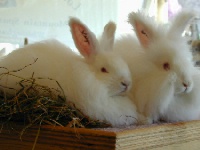|
Yarns
Reviews
 More articles
More articles
Shops
Links

Related info
New this week
Subscribe!
Tell a friend
Home


|
|
|

Fiber Profile:
Angora

Eight times warmer than wool, angora is a fine, silky fiber that is produced by the angora rabbit.
These friendly, popular animals can produce a maximum of one pound of fiber each year, although most breeds produce a little less than that. In its purest form, angora is extremely expensive. That's because it must be brushed or gently plucked off the rabbits by hand, often as frequently as every few days.
Rabbit Types
Angora rabbits are thought to have originated in Ankara, Turkey. They became extremely popular in France, and were equally well-received in England immediately following the French Revolution.
Angora rabbits didn't make their way to the United States until after World War I, and today they are highly prized as pets, show animals, and fiber producers.
There are four main breeds of angora rabbit: French, English, Giant, and Satin. The grandfather of all breeds is the French angora, from which all other breeds ultimately originate. In general, these animals range in weight from five to more than 10 pounds.
Colorful Varieties
You'll find anogra rabbits in six general color groups: Agouti, Pointed White, Self, Shaded, Ticked, and Wide Band. If you're lucky enough to get angora in any of these natural colors, it is truly exquisite.
Unfortunately, most yarn manufacturers still insist on dying angora fiber, and typical can be powder-puff pinks, yellows, blues, and whites.
Bunny Blends
Many people dislike angora because of its tendency to shed, which can cause sneezing or general irritation. This, combined with the high price of the fiber, has motivated yarn manufacturers to produce angora blends instead.
Wool and silk are particularly good fibers for blending with angora, because they help tame the angora fuzz and bring out its best qualities.
Today, most knitters reserve pure angora for trim or detail work on larger garments, unless they're lucky enough to have their own source of angora fiber.
Last Updated 01/04/01 Add your comments
|
|